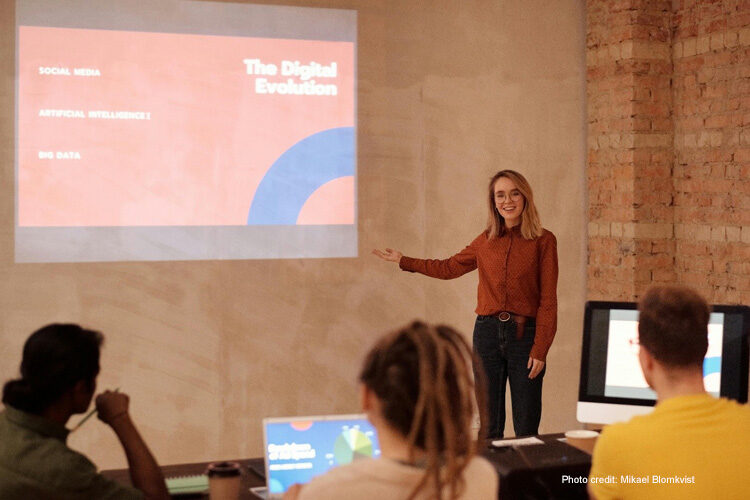Very few teachers, worldwide, are effectively applying Artificial Intelligence in their classrooms, gymnasia, studios and laboratories, although the proportion doing so in some countries is rapidly increasing. In this blogpost, Mike Douse suggests that, not only should all who teach become familiar and confident with contemporary technology, but also that every teacher should be enabled to become an effective AI Education Manager.
A recent OECD survey of some 280,000 lower secondary teachers in 17,000 schools across 55 education systems, indicated that three in four of them feel that they lack the knowledge or skills to teach using Artificial Intelligence (AI); this proportion is likely to be far higher at primary and pre-primary levels. Unsurprisingly, the level of effective classroom AI application is much greater in, for example, the USA, UK and China than in, for instance, some small island states and much of sub-Saharan Africa.
Contemporary technology both necessitates and enables fundamentally transformed education, both responsive to and actively stimulating rapidly-changing workplaces, communities and societies. As a recent UNESCO publication makes clear, “in this evolving AI world, the education system needs to redefine and adapt itself. Educators, students, and citizens alike must actively collaborate to create normative instruments and ensure AI serves learning without replacing the human essence that defines it.”
AI necessitates and enables radical educational re-thinking and reorganisation, emphasising collaboration between educators and digital systems. It will inevitably affect educational organisations at all levels – from classrooms and schools, through to national structures and worldwide linkages. The need is for a greater creative focus on the potential of AI, requiring not merely the use of educational technology in classrooms but a systemic integration of digital processes in schools embracing, for instance, curriculum and governance, enrolment and record processes, assessment and counselling, and the extensive use of learning analytics.
The present author’s earlier contributions to this discussion extend to personalised learning, global accessibility, digital pedagogies, human-AI collaboration, ethical issues and potential dangers, the need for pre- and in-service teacher education to gear itself sensibly and securely to the evolving situation, and maximising the effectiveness and the enjoyment of education.
As education itself is metamorphosised, so too will the roles of teachers evolve, requiring manifest competence and confidence in operating in harmony with AI. Whether in class or online, face-to-face or at a distance, they may be enabled to come into their own in advising, supporting, coaching and encouraging learners. All teachers should not only be enabled to master contemporary technology as it evolves but also to apply an AI-linked pedagogy appropriate to their educational phase, subject area and personal style.
As the transformation takes place, the need will be for sufficient, suitable and enthusiastic teachers to enable successful early childhood education (still the vital phase) and primary completion. With a world of information and ideas at their fingertips, post-primary and lifelong learners now call upon teachers for support rather than leadership, for guidance as opposed to discipline, and for encouragement instead of assessment, thereby offering an enhanced and more professionally rewarding role.
Today’s competent teacher already coordinates learning experiences embracing books, videos, information-gathering, open discussions, experiments, simulations and much besides. Society’s and education’s transition calls for this to be achieved in the AI context, with all the opportunities that this evolving situation offers.
In these exciting and in some senses terrifying times, businesses seeking to leverage the power of AI, while navigating its complexities, are identifying suitable AI managers. Their primary focus is on selecting the best technologies to meet their company’s goals while foreseeing and handling the associated risks, balancing quality with efficiency, and ensuring that each project meets the intended objectives without compromising standards. As well as technical and analytical skills, these AI managers must also have a strong ethical foundation, understanding the implications and potential biases of AI systems in order to prevent misuse or unintended harm.
Tomorrow’s effective teachers will fulfil similar roles and perform similar functions, managing educational AI in order to improve delivery and learning experiences. They may use, for instance, virtual mentors, voice assistants, automatic assessments, computer-generated learning environments, along with active learning activities such as problem-based learning, multi-location group discussions, peer teaching, reflective practice and digital multi-media elements. They will call upon AI-powered educational games, adaptive learning platforms, automated grading and feedback systems, chatbots for student support, curriculum and content development, and intelligent tutoring systems covering both out of the ordinary subjects and learners with special educational needs.
This involves directing intelligent systems. Soon, the most effective teachers will not know just how to use AI – they will know how to manage it. And that requires a fundamentally different skill set than heretofore, covered by teacher education and continuous professional development. It involves ‘mastery’ both in the sense of capability and the recognition that it is the human, rather than the machine, who is ultimately in charge. If industry and commerce can do it, so too can education, throughout all phases and across the ever-shrinking globe.





